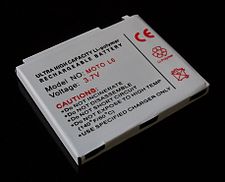
Back بطارية بوليمرات الليثيوم Arabic Bateria d'ió liti en polímer Catalan Lithium-polymerový akumulátor Czech Lithium-Polymer-Akkumulator German Batería de polímero de litio Spanish Liitiumpolümeeraku Estonian باتری لیتیم پلیمر Persian Litiumpolymeeriakku Finnish Litij-polimer baterija Croatian Baterai polimer litium ID
 A lithium polymer battery used to power a smartphone | |
| Specific energy | 100–265 W·h/kg (0.36–0.95 MJ/kg)[1] |
|---|---|
| Energy density | 250–670 W·h/L (0.90–2.63 MJ/L)[1] |
A lithium polymer battery, or more correctly lithium-ion polymer battery (abbreviated as LiPo, LIP, Li-poly, lithium-poly and others), is a rechargeable battery of lithium-ion technology using a polymer electrolyte instead of a liquid electrolyte. Highly conductive semisolid (gel) polymers form this electrolyte. These batteries provide higher specific energy than other lithium battery types and are used in applications where weight is a critical feature, such as mobile devices, radio-controlled aircraft and some electric vehicles.[2]
- ^ a b "Lithium-Ion Battery". Clean Energy Institute. Retrieved 6 January 2022.
- ^ Bruno Scrosati, K. M. Abraham, Walter A. van Schalkwijk, Jusef Hassoun (ed), Lithium Batteries: Advanced Technologies and Applications, John Wiley & Sons, 2013 ISBN 1118615395,page 44
© MMXXIII Rich X Search. We shall prevail. All rights reserved. Rich X Search